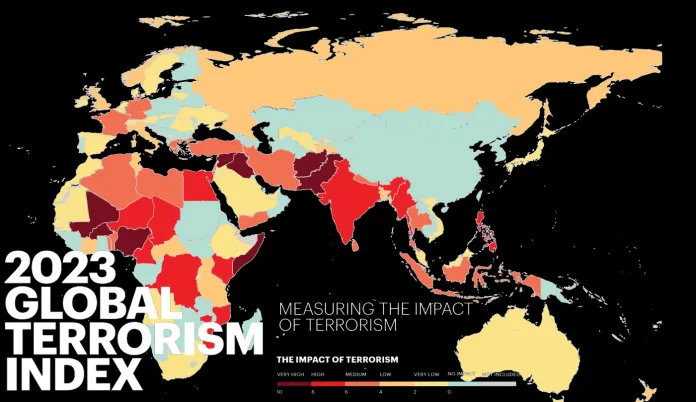Press release 17th March, 2023
With 8.065% score, Nigeria, according to the just-released Global Terrorism Index (GTI) is now the 8th (8.065 score) most terrorized country. This was as its bordering countries to the north, east and west have also increasingly become notorious for terrorism, with Niger ranking 10th (7.616), Cameroon and Chad at 11th (7.347) and 19th (6.168) positions respectively; and Benin at 28th position (4.840). Only Guinea to the east is safe as per the recently released index which analyzed the impact of terrorism across nations and covers 99.7 percent of the total world’s population.
Although Nigeria’s 2022 ranking was considered an improvement in comparison with 2021, as it drops by 2 places, increasing terrorism activities in the Sahel region calls for concern, as Islamic State of West Africa (ISWA), Boko Haram, and Indigenous People of Biafra (IPOB) also made it to the top ten deadliest terrorist organizations in the world in 2022, ranking 6, 7 and 10 respectively.
The index developed by the Institute for Economics & Peace (IEP) using data from Terrorism Tracker and other sources indicated a beehive of terrorism activities in the Sahel region of sub-Saharan Africa, which it described as “now the major epicenter of terrorism, with the Sahel accounting for more terrorism deaths in 2022 than both South Asia and the Middle East and North Africa (MENA) combined.” It further noted that terrorism-related death in the region accounted for 43 percent of the global figure, and a seven percent increase from 2021.
The report attributed the rise of terrorism in the region to complex and systemic underlying factors including weak governance, ethnic polarization, ecological insecurity, abuses by state security, pastoral conflict, the growth of transnational Salafi Islam ideology, political instability, transnational crime, food insecurity and geopolitical competition.
As with other organized crimes, terrorism is a transnational operation, hence, the need for intergovernmental collaboration has become more urgent than ever to stem the tide in the Sahel region. This empirical insight into terrorism activities means that countries in the region must, as a matter of necessity come together and proffer practical solutions that will address the aforementioned factors that continue to fuel terrorism. The situation in the tri-border area of Mali, Burkina Faso and Niger needs to be swiftly subdued for the security of civilians and state security actors.
In Nigerian situation, the Center is calling for the strengthening and implementation of legal framework. Working with stakeholders, the Center ensured the passage and signing into law of the Terrorism (Prevention and Prohibition) Act in May 2022. For instance, Part X (Section 63-75) provide measures for investigating and prosecuting of terrorism offences; we are therefore calling for an aggressive implementation of the law.
As we make progress with combative efforts in the fight against insurgency, the country must also up its non-kinetic approach to addressing the challenges of terrorism. More attention should be paid to building peace instead of overreliance on force as the only solution. Necessarily, the government must strengthen institutions, reduce corruption and collusion by state actors, and address the fundamental issue of poverty in order for the country and region to make progress in subsequent rankings.
Victor Agi
Head, Public Relations

